Faith

For the second time in less than a year, the Gallup poll reports that a majority of Americans would vote for an atheist for president.
The latest survey, from June, found that 54 percent of those asked said they would vote a “well- qualified” atheist into the Oval Office — the highest percentage since Gallup began asking the question in 1958, when only 18 percent said they would back a nonbeliever.
On the other hand, the survey showed that those who do not believe in God still come in behind every other group polled for, including gays and lesbians (68 percent) and Muslims (58 percent).
Still, an imaginary atheist candidate passed the 50 percent threshold for the first time when Gallup asked the question in August 2011, so the trend is upward.
“We have seen an enormous change over time in the willingness to vote for an atheist,” said Karlyn Bowman, a senior fellow at the American Enterprise Institute for Public Policy Research, which reports the numbers in its current newsletter.
“But I think the numbers also remind us that this is a deeply religious country. That doesn’t mean we are all going to church on Sunday, but that having religion in your life is valuable to most Americans and I think that explains the resistance.”
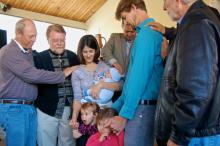
Christians toss out blessings like beads at Mardi Gras. They get offered so often and in so many contexts that it’s hard to know what exactly it means. So I thought I’d break down at least some of the kinds of blessings floating around out there.
The Post-Sneeze Blessing: This is a weird one, because we don’t bless people for coughing, yawning or any other bodily function. So why sneezing? No one is exactly sure, though some believe it dates back to Pope Gregory in the early first Century AD when the bubonic plague was everywhere in Europe. As the plague got closer to Rome, myth has it that the Pope ordered perpetual blessings around the city. So when someone sneezed, offering them a blessing was like a small insurance policy against the plague.
I actually heard a different one growing up that I liked better. There was an old superstition that sneezes were a means the body used to expel evil spirits from within. So once the bad mojo was on the outside, it was incumbent upon others to bless the sneezer, in an effort to keep them from sucking the demons or whatever back in.
The Backhanded Blessing: I grew up in Texas, and this was a real favorite in the south. It was generally offered in someone’s absence, and immediately following some kind of gossip or insult. An example might be, “Poor Mabel Jean’s husband has slept with everyone in town except for her, bless her heart.” Apparently the blessing neutralizes the damage of the bad stuff....

Whether churchgoers realize it or not, the trees in their churchyards have religious roots.
Those tall, thin-branched trees on the corner of this city's Episcopal Church Center of Utah, Purple Robe Black Locusts, were probably named after a biblical reference to John the Baptist eating locusts and honey.
Nearby, the crab apple tree just outside the Episcopal Cathedral Church of St. Mark produces a small, sour fruit used by 15th-century monks to treat diarrhea, dysentery, and gallstones.
And the flowers of a nearby dogwood tend to bloom around Easter.
“My hope,” said University of Utah biology professor Nalini Nadkarni, “is [worshippers] will realize that nature and trees are as much a part of their sacred ground and worthy of reverence as what goes on inside a cathedral or church.”
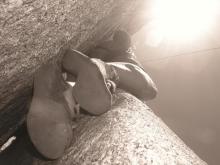
Recently, Keith Anderson, my friend and co-author on Click 2 Save: The Digital Ministry Bible, wrote a post that’s been stirring a good deal of interest — and concern — across the blogosphere.
Anderson’s piece, “What Young Clergy Want You to Know,” has, I suspect, attracted so much attention because it dives right into the middle of the frustration, anxiety, and discouragement one increasingly finds among clergy of all ages and levels of experience, but that is amplified among younger clergy because they’ve made a vocational commitment to the Church at a time when such a choice seems crazier than ever.
This, as Anderson points out in the post, is because younger clergy “understand they are presiding over the death of American Christendom.”
Younger clergy, says Anderson, “are worried about job security — not just about getting paid (which is not always a given) — but whether they can do the job they feel called to do in congregations that don’t want to change.” He continues, “Being prophetic is an attribute we laud in seminary, but it can get you fired in the parish.”
Well, there you have it. The unvarnished truth of vocational experience in institutional contexts that over time wears out even the most patient, most tolerant, most enthusiastic of clergy. The wrenching responses to the post make clear that Anderson struck a nerve among his clergy colleagues.
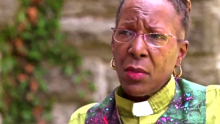
The Rev. Andrena Ingram is currently the only known Lutheran ordained pastor living openly with HIV. Her husband's death from an AIDS-related illness, and the shame that he felt, inspired the pastor to be open about her own diagnosis with HIV. She is known as "The HIV Minister" – a title that has helped others with HIV reach out to her for help.
Listen to Ingram tell her story inside the blog...
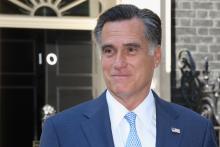
Though Mitt Romney talks little about his faith on the campaign trail, he grew up in the Mormon Church and spent years as a top church leader in Massachusetts. From 1986 to 1994, he was president of the Boston stake, an entity similar to a Catholic diocese. Before that, Romney was bishop, similar to a lay pastor, of congregations in Belmont and Cambridge. Each job included both organizational work and counseling.
After leaving the stake president position, Romney taught Sunday school for a year, then oversaw the church’s programs for teenagers for around two years. Romney continues to tithe — giving 10 percent of his income to his church. In accordance with Mormon teachings, he does not drink alcohol, tea or coffee. He attends church services when he can. Romney's campaign did not respond to requests for comment on this story.
As a church leader, Romney ran the church with businesslike efficiency.
“He was very serious about doing an excellent job about things and he didn’t suffer fools,” said Helen Claire Sievers, executive director for the Harvard-affiliated WorldTeach, who was active in the church when Romney was stake president.

A palpable feeling of hope and urgency hung heavy in the air of Washington, D.C., this week as thousands of activists descended on the nation’s capital to encourage and inspire colleagues and decision-makers to “turn the tide on AIDS.”
The International AIDS Conference 2012 has returned to the United States, thanks in part to the lifting of the HIV/AIDS travel ban by the Obama Administration in 2010, which followed work from President George W. Bush also to lift the ban.
As part of the Conference, faith leaders from across the world were invited Tuesday morning to a forum hosted by the White House. It was an opportunity to hear from U.S. and international experts and officials, as well as come together as a community of faith, standing up against the stigma and isolation which have been two of the biggest roadblocks to achieving the goal of an AIDS-free generation.
Tuesday’s event centered around two panel discussions — one examining what the faith community uniquely brings to the table in tackling the HIV/AIDS epidemic, and the other focusing on the relationship between governments and people of faith in building the effective partnerships needed to tackle it.
The tone of the discussions was, in many ways, extremely positive. We heard about vast improvements in treatments and holistic care, services often administered by faith-based organizations around the world.
“Hope,” as White House Office of Faith-based and Neighborhood Partnerships Executive Director, Joshua DuBois, noted, is overcoming “fear.”

Nothing is sweeter than love, nothing stronger, nothing higher, nothing wider,
nothing more pleasant, nothing fuller or better in heaven or earth;
for love is born of God, and can rest only in God above all created things.
And so my musings on Thomas a Kempis, for whom Jesus the Christ was Love Incarnate, begin.
Will it frame my day? Will it help me make sense of French class?

JERUSALEM — Despite international pressure — including support from both U.S. presidential candidates — the International Olympic Committee has refused to include a moment of silence at Friday's (July 27) opening ceremony for Israeli athletes killed by terrorists at the games 40 years ago.
President Obama and his likely GOP challenger, Mitt Romney, have both called for the IOC to honor the 11 Israelis murdered in Munich in 1972.
"We absolutely support the campaign for a moment of silence at the Olympics to honor the Israeli athletes killed in Munich," Obama spokesman Tommy Vietor said in a statement.
IOC President Jacques Rogge said a smaller, more somber ceremony would better memorialize the tragedy.
IOC officials made a brief statement and held a moment of silence on Monday during a pre-Olympics event in London, where the 2012 games begin on Friday.
"I would like to start today's ceremony by honoring the memory of 11 Israeli Olympians who shared the ideals that have brought us together in this beautiful Olympic Village," Rogge said.

Across five states and 20 years, on the couch at the psychoanalyst’s, wadded Kleenex in my hands, and kneeling on the marble floor of the confessional, incense curling through my hair, I sorted through the jagged prisms of experience that, as a child, I did not understand: What it means to be in the constant presence of someone who does not look you in the eye, who lives beyond the bar of constant preoccupation.
I didn’t understand then the tiresome vigilance I’d develop as a result—the almost unconscious, constant mental sorting to see if, at that moment, I was OK, or if others were about to abandon me forever—a reaction I’ve heard is common among children of alcoholics, and which I’ve seen myself in the needy inner-city children I have taught.
Along the way, I discovered that the seed of my mother’s sadness had been there all along, from my earliest memory, well before my father died. And by the time I was a toddler, the seed had germinated in me, too.

Worshippers in Aurora, Colo., rocked by the July 20 mass shooting flocked to church Sunday, seeking solace within their faith communities.
"People are saying that if there's a day to go to church, this is it," said Allie McNider, associate pastor at Mississippi Avenue Baptist Church, about a mile from the movie theater where police say James Holmes opened fire, killing 12 people and wounding 58 more. "They're looking for a sense of something bigger than themselves."
Meanwhile, in Rancho Penasquitos, Calif., a San Diego suburb and the hometown of alleged shooter James Holmes, Pastor Greg Hoffmann prayed with his congregation at Penasquitos Lutheran Church, where the Holmes family are members.
Hoffman spoke of the pain and shock the church community was feeling. He preached on the verse from Mark in which Jesus tells his disciples to "come with me to a quiet place."

I’ve been a fan of Chick-fil-A for a long time. Their food is always great, their service is impeccable (almost to the point of being a little creepy), and the restaurants are squeaky clean.
It’s not every day that you can enjoy a fast food restaurant where you actually feel like you’re putting something reasonably good for you in your body. Well, at least not as bad as some.
But the point is, I have always liked them. And if I like them, my wife, Amy is practically a Chik-fil-A disciple.
We’ve planned meals on the road around their locations. Sure, I’ve known Chik-fil-A was a Christian-based organization with some values that leaned farther right than my own, but I respected their business model and ethic. Plus, I’m used to having fellow Christians to my right.
And then I saw this video:

Love, we read over and over in the Bible, casts out fear.
The angels to Mary: Do not be afraid. To the shepherds: Do not be afraid. Do a search on that phrase and you’ll find it numerous times from 2 Kings through Revelation. When he appears to humans, our God of love is always prefacing his messages with, “Do not be afraid.”
As a mother, I want to raise brave kids who hear that message and know it to their toes. Everything is going to be all right. Love wins, as they say.
I want them to be people who know that there is a bigger picture, a spiritual promise of hope and redemptive, even when life circumstances feel frightening.
I don’t want them to lose sight of it or fail to see God’s gifts of love around them because they are afraid of what, ultimately, cannot harm them.
It’s not always easy, however, for me to be brave.
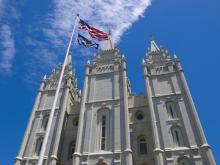
Stephen Mansfield, an evangelical author who has written widely about the faith of politicians, turns his attention to Mormons in his latest book, The Mormonizing of America.
He talked with Religion News Service about how the Church of Jesus Christ of Latter-day Saints — including GOP presidential candidate Mitt Romney — has progressed from persecution to prominence.
The interview has been edited for length and clarity.
Q: You’ve written “The Faith of George W. Bush” and The Faith of Barack Obama. Why did you write “The Mormonizing of America” instead of “The Faith of Mitt Romney”?
A: I thought that the story of Bush at the time was bigger than the story of evangelicals and the religious right at that time. I thought the story of Obama personally was bigger then the story of the religious left that he was sort of the champion of. But in this case I think that the story of the Mormon moment or this Mormon ascent is a bigger story than Mitt Romney. There’s something broader going on and he’s not so much the champion of the movement, maybe just at the vanguard of it....
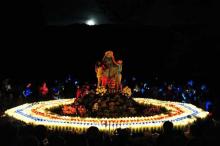
BIRMINGHAM, Ala. — Could a Virgin Mary statue under a pine tree in the middle of a cow pasture in rural Alabama one day become an officially recognized international pilgrimage site of the Roman Catholic Church?
Yes, it could, said Michael D. Murphy, chairman of the anthropology department and a professor of anthropology at the University of Alabama who has specialized in studying the role of Virgin Mary apparitions in the Catholic Church.
“Without a doubt,” Murphy said. “Some very unusual places have ended up becoming pilgrimage sites.”
Marija Lunetti, the visionary who has been reporting daily visions of the Virgin Mary since she was a teenager in Medjugorje, Yugoslavia, had two outdoors apparitions in a field under a pine tree in Shelby County, Ala., during a highly publicized “five days of prayer” July 1-5 at Caritas of Birmingham.
Lunetti was one of six Medjugorje youths who began reporting apparitions of Mary in 1981. She was 16 at the time and known as Marija Pavlovic. Now 47, married with four children and living in Italy, Lunetti continues having daily visions.
She has been visiting Alabama since 1988, when she came to donate a kidney at UAB Hospital for her brother, Andrija Pavlovic. She had apparitions in the hospital and at the home of Caritas of Birmingham founder Terry Colafrancesco.
A fascinating piece from The Atlantic looks at faith and spirituality amongst those who have travelled across our universe:
"For many people, space represents its own religion, a spiritual experience on its own, secular terms, with no help from the divine or ancient rituals. But for those who believe and travel into space, the experience can endow their faith with greater significance. There is awe in science because, simply, there is awe in reality. We use science to discover that reality, and some use religion to understand it, to feel it deeply."
Read the full article here
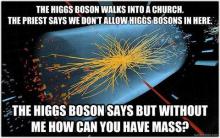
Thanks to Steve Knight for alerting me to this joke, which has become one of my instant favorites. After all, it combines two things I dig: nerd humor and theology (also nerdy).
Yeah, yeah, you may be groaning, but you’re smiling while doing it. Admit it.
There’s plenty of chatter lately about the so-called “God Particle,” recently discovered , with some in the scientific field actually calling it the “goddamn particle,” because (at least as I understand it) the discovery opens up the possibility of something without detectable mass actually giving mass to other particles.
Kind of like: In the beginning there was nothing, and then…
Sound familiar?
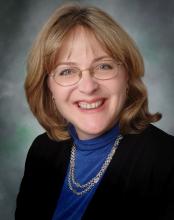
In recent days, conservatives have attacked the Episcopal Church. The reason? The church has just concluded its once every three-year national meeting, and in this gathering the denomination affirmed a liturgy to bless same-sex unions. Conservatives assert that the Episcopal Church's ever-increasing social and political progressivism has led to a precipitous membership decline and ruined the denomination.
Many of the criticisms were mean-spirited or partisan, continuing a decade-long internal debate about the Episcopal Church's future. However, New York Times columnist Ross Douthat broadened the discussion, moving beyond inside-baseball ecclesial politics to ask a larger question: "Can Liberal Christianity be Saved?"
The question is a good one, for the liberal Christian tradition is an important part of American culture, from dazzling literary and intellectual achievements to great social reform movements. Mr. Douthat recognizes these contributions and rightly praises this aspect of liberal Christianity as "an immensely positive force in our national life."
Despite this history, however, Mr. Douthat insists that any denomination committed to contemporary liberalism will ultimately collapse. According to him, the Episcopal Church and its allegedly trendy faith, a faith that varies from a more worthy form of classical liberalism, is facing imminent death.

Among the list of U.S. institutions—banks, the medical system, the U.S. Supreme Court, Congress—where would you pin organized religion?
According to a recent Gallup poll, it comes in fourth, falling behind the military, small business, and police. Only 44 percent of Americans have a "great deal" or "quite a lot" of confidence in the church—a downward fall that has been the trend since its height in the 1970s.
Drilling down, Protestants tend to have higher confidence—56 percent—in their churches than Catholics, who fall in at 46 percent. (Commentary is linking this to the child abuse scandals.)
Organized religion isn't alone in this. The overall lack of confidence in American institutions is evident across the board, with television news at 21 percent and Congress at an abysmal 13 percent. Even public schools come in at 29 percent.
But is this at all surprising?
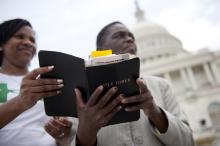
Learning to speak as a Christian is one of the most important and often ignored aspects of our discipleship. Nowhere is this fact more obvious than when churches try to talk about politics. When the small group leader makes a disparaging comment about Mitt Romney’s Mormon faith, or a car rolls into the church parking lot with a “NOBAMA” bumper sticker proudly displayed, what do we do?
Is bumper sticker propaganda and negativity the best we have to offer?
Admittedly it can be risky to talk about politics in the local church. All it takes is one idea or statement that flies in the face of someone’s deeply held convictions and that could be the end of our influence and the end of that person’s involvement in our ministry.
Still, the upcoming presidential election will be the defining cultural event of the next six months. If we completely ignore it we are missing a golden opportunity for discipleship.
How can churches have a healthy conversation about politics in the middle of a national election without demonizing the opposition and causing disunity?
I’ve been working on this question for months now, and as part of my preparation I wrote a book called Public Jesus. Here’s a little bit about what I’ve learned in the process:
1) Love the One You’re With